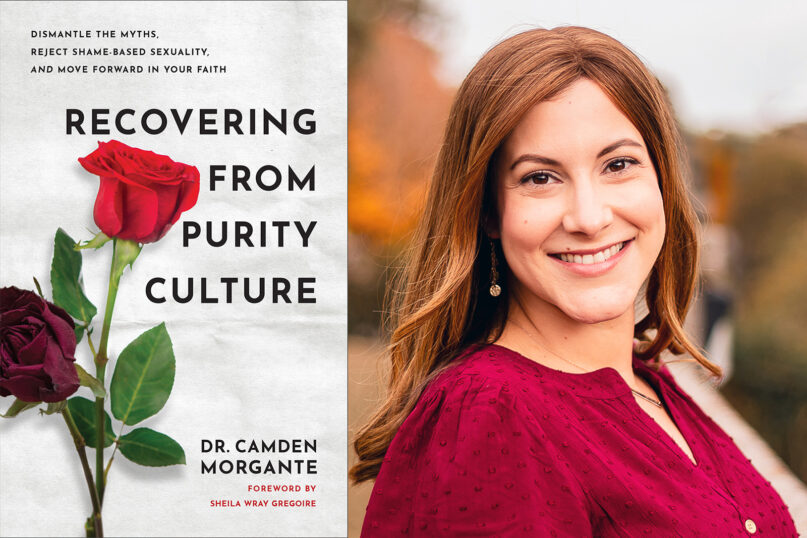
(RNS) — The shock of Joshua Harris’ deconversion has still not worn off. Even Harris can’t seem to stop replaying his disavowal of Christianity.
In the summer of 2019, Harris, once the darling of evangelical Christians for his purity culture diatribe, “I Kissed Dating Goodbye,” announced his deconversion from the Christian faith in a now infamous Instagram post. Harris shared that he had “undergone a massive shift in regard to my faith in Jesus. The popular phrase for this is ‘deconstruction,’ the biblical phrase is ‘falling away.’ By all the measurements that I have for defining a Christian, I am not a Christian.”
“I Kissed Dating Goodbye,” published when Harris was just 23, became the Christian cult classic that defined courtship practices. His second book, “Boy Meets Girl,” describing his beyond platonic courtship with his wife, promised that following this method of biblical courtship — which he defined as one avoiding dating, having physical contact or even being alone with a prospective spouse before marriage — would lead to a satisfying, lifelong Christian partnership.
Harris’ deconversion story sent ripples through Christian media, but for those of us who grew up in purity culture looking to his books as our guides, his falling away left us deeply affected. To see the poster boy of the movement that caused us years of shame, confusion and agony publicly denounce his former beliefs and his faith caused us to question the credibility of purity culture itself. If one its founders is getting divorced and walking away from his faith, where does that leave us?
Harris has repeatedly repented of his role in perpetuating purity culture. In 2018, he released a statement condemning the principles laid out in his book and pleading with his publisher to take the book out of print. He later participated in filmmaker Jessica Van Der Wyngaard’s 2019 documentary, “I Survived I Kissed Dating Goodbye,” and in an “apologies tour” of interviews with pastors, authors and readers of his book.
Just this week, Harris re-released an apology and explained his change of heart, stating, “I now believe dating can be a healthy and valuable part of a person’s growth.” He admits his book “emphasized practices … that are not found in the Bible” and “instilled fear in many readers.”
I want to call Harris the “father” of the evangelical purity movement, but I believe he was both a victim and a perpetrator of the shaming and legalistic ideals of purity culture. He confessed, “My own marriage ended in 2019, and I see in an even deeper way how damaging purity culture and its teachings about sex, gender, and relationships have been for so many people – myself included.”
I respect Harris’ humility and public admissions of culpability. It’s a teachable attitude and willingness to listen that I don’t see in other authors of the purity movement, even when research shows that messages from their books increased evangelical women’s rates of sexual pain and lowered rates of sexual pleasure, desire and trust in marriage.
Harris seems to recognize the unintended consequences of his books. “I regret any way that my ideas … gave you a wrong view of yourself, your sexuality, or your relationships.”
But his apologies fail to mention the damage these kinds of toxic teachings do to our faith.
When I asked my social media audience what prompted their faith deconstruction, the overwhelming majority named purity culture and patriarchy as the reasons. Specifically for me, Harris’ book and the other false promises of purity culture promoted what I now call the fairy-tale myth — the belief that if I followed the rules, God would grant me the desires of my heart in the form of a godly spouse, loving marriage and amazing sex life. Today Harris admits “these outcomes are not promised in scripture.”
No wonder purity culture has been called the “sexual prosperity gospel.” It promises us a reward from God as long as we hold up our end of the bargain. But when we do everything God asks and we don’t get the promised reward, then what? This is the unanticipated harm of purity culture. By setting us up for disappointment through unbiblical claims of sexual prosperity, purity culture causes trauma to our faith.
This is a trauma I imagine Harris is intimately aware of, yet hasn’t publicly acknowledged. Much attention has been paid to the way purity culture affects our sexuality and relationships. But we can’t forget the disillusionment in our faith that results from believing in blessings promised by man and not by God. For Harris, this led to a deconversion from Christianity. For me and many others affected by purity culture, it leads to the painful work of deconstructing and reconstructing our faith, trying to disentangle God’s truth from purity culture’s myths.

“Recovering From Purity Culture” and author Camden Morgante. (Courtesy images)
And as I learned in my own recovery from purity culture and in my work as a therapist and coach, it is a painful road to walk. It’s not enough to cognitively leave the messages of purity culture behind because the trauma of those teachings is stored in the body. And these effects continue to live on in our bodies long after we no longer believe purity culture in our minds. To heal from purity culture, we need holistic healing, with our head, heart, body and soul aligned.
Harris concluded his apology by saying: “To those who were harmed by the book, I want to say I am truly sorry. I regret the ways its message caused fear, shame, or confusion about relationships, identity, and sexuality. While I can’t undo the harm, I hope this apology … will bring some measure of healing.”
I appreciate Harris’ apology and share in his hopes for healing. But this journey is ongoing for many of us who grew up in purity culture — not just in healing our sexuality and relationships, but also our faith.
(Camden Morgante, a licensed clinical psychologist, is the author of “Recovering From Purity Culture,” from which this essay is adapted. The views expressed in this commentary do not necessarily reflect those of RNS.)
